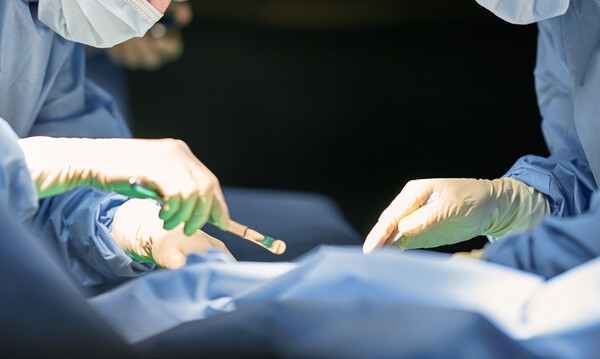
The government allowed "physician assistant" (PA) nurses to practice more at healthcare sites from Friday, issuing supplementary guidelines on the scope of practice for nurses amid ongoing walkouts by trainee doctors and ensuing medical disruptions.
The move came as neither trainee doctors nor the government budged from their positions on the planned increase in medical school quotas in 2025.
Escalating the tension, senior physicians at university hospitals are vowing to resign in protest against the government’s suspension of medical licenses for trainee doctors defying Seoul’s back-to-work order.
What’s allowed for PA nurses?
On Wednesday, the Ministry of Health and Welfare issued guidelines for PA nurses' non-delegable tasks and the scope of nurses' practice support duties in a pilot project.
Among over 100 listed tasks, only eight were classified as non-delegable, signaling a significant expansion of nurses' responsibilities.
Here is the list of medical tasks allowed for nurses: simple physical examinations such as questionnaires, prognosis, and medical history checks; checking and reporting inpatient status during rounds; blood sample collection; blood culture; C-line & PICC blood collection; nasal swab culture; suction tip culture; arterial blood collection via A-line; sample division; EKG; ultrasound; urodynamics; ultrasound residual volume check; wound swab, culture; rectal specimen collection; Covid-19 testing; use of ABGA machine (ICU, recovery room); simple dressing; indwelling catheterization; assisting and keeping patient during C-line/PICC/PCD/PTBD insertion; central venous line management; chemo port needling; removing hemostatic Q-pad after vascular interventional procedures; administering prescribed anesthetics; providing emergency CPR; administering emergency medications; L-tube extubation; entering surgery fees; reporting adverse effects of treatment; tracking test results; monitoring special devices (ECG, ECMO, etc.); educating and counseling patients and guardians; and operating patient self-help groups.
What’s still not allowed for nurses
On the other hand, the government’s guidelines stated that PA nurses cannot perform the following tasks: X-ray, intra-articular injection, bladder incontinence, urinary diversion, drainage tube insertion, surrogate surgery, insertion and removal of fixation in fractures, general anesthesia/spinal or epidural anesthesia, preparation of advance directives, and prescription of ethical drugs.
Emergency care specialists raise concerns for patient safety
However, emergency medicine specialists have raised concerns that certain practices by nurses cannot ensure patient safety.
The Korean Society of Emergency Medicine issued a statement on Thursday, saying, "Tracheal intubation and extubation, emergency cardiopulmonary resuscitation, emergency drug administration, central line insertion, and peripherally inserted central catheter (PICC) insertion, which are medical procedures that have a profound impact on patient safety,” should not be performed by nurses.
The practice of advanced cardiac life support (ACLS) beyond basic life support (BLS), such as chest compressions, positive pressure ventilation (ventilation), and the use of an automated external defibrillator (AED), by a nurse alone, or the practice of intubation or administration of emergency medications, poses a serious concern for the life and safety of the public, the society said.
"In particular, advanced medical procedures, such as intubation and central line insertion, are still performed in clinical practice by only a subset of clinicians, including emergency medicine physicians," it emphasized.
Seoul won’t blame PA nurses for medical errors: ministry official
Lim Kang-seop, director of the Health Ministry’s Nursing Policy Division, said the pilot project broadening nurses’ work scope in medical practice would not hold hospital directors or PA nurses legally responsible.
The guidelines state that the scope of nurses' duties should be determined by the “Nurse Scope of Work Coordination Committee” in consultation with the criteria provided by the Health Ministry, and managed and operated under the final responsibility of the head of the medical institution.
In particular, the guidelines stated, "In the event of an accident caused by a lack of management and supervision, legal responsibilities such as administrative and civil liability and criminal penalties shall be attributed to the head of the medical institution.
Because of this provision, there is a perception that the hospital director is responsible if an accident occurs during the pilot project, but the premise is “in the event of an accident due to lack of management and supervision,” Lim said.
"With good management and supervision, the hospital director will not be held legally responsible," he added. "We will not hold PA nurses (who acted directly) legally responsible, and they will be exempted in the event of a medical accident," he said.
Related articles
- Korea mobilizes over ₩200 billion per month to maintain emergency care
- Seoul moves to fill junior doctors’ void with PA nurses, but hospitals say ‘No.’
- Confusion reigns from day 1 of putting public health doctors in teaching hospitals
- Exodus of medical residents forces neurological society to cancel workshop
- 'Void of trainee doctors, Big 5 hospitals could suffer bankruptcies in a cascade'
- From March, tertiary hospitals will get ₩18 million monthly if they hire a physician
- Experts clash over effective dates of trainee doctors' resignation letters
- [Contribution] Truth about medical professors’ resignations
- Seoul's ultimatum to trainee doctors: return to teaching hospitals or face de facto license revocation
- 81% of nurses leave hospitals in less than a year; 11% give it up for good
- Nurses are forced to do physicians' jobs amid escalating healthcare crisis

